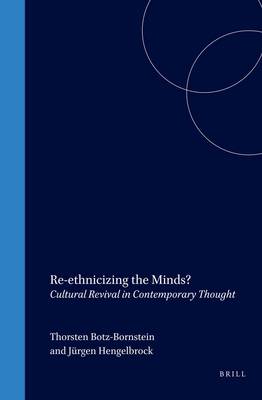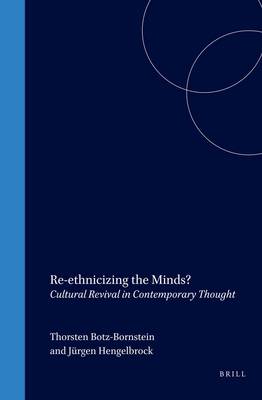
- Afhalen na 1 uur in een winkel met voorraad
- Gratis thuislevering in België vanaf € 30
- Ruim aanbod met 7 miljoen producten
- Afhalen na 1 uur in een winkel met voorraad
- Gratis thuislevering in België vanaf € 30
- Ruim aanbod met 7 miljoen producten
Zoeken
Re-Ethnicizing the Minds?
Cultural Revival in Contemporary Thought
€ 261,45
+ 522 punten
Omschrijving
The predominance and global expansion of homogenizing modes of production, consumption and information risks alienating non-Western and Western people alike from the intellectual and moral resources embedded in their own distinctive cultural traditions. In reaction to the erosion of traditional cultures and civilizations, we seem to be witnessing the re-emergence of a tendency to "re-ethnicize the mind" through renewed and more or less systematic cultural revivals worldwide (e.g., "hinduization," "ivoirization," "sinofication," "islamicization," "indigenization," etc.). How do and should philosophers understand and assess the significance and impact of this phenomenon? Authors acquainted with the contemporary situation in Africa, Asia, the Middle-East, South-America, and Europe try to answer this question.
In the final analysis, the authors of this original and groundbreaking collection of essays plead for a full critical engagement with one's own particularity while at the same time rejecting any form of cultural, national or regional chauvinism. They consider various ways in which local and global conceptions as well as practices can and already do judiciously inform and positively fertilize each other. At this juncture of history, they argue, societies and peoples must articulate their self-identity by looking critically at their respective cultural resources, and beyond them at the same time.
In the final analysis, the authors of this original and groundbreaking collection of essays plead for a full critical engagement with one's own particularity while at the same time rejecting any form of cultural, national or regional chauvinism. They consider various ways in which local and global conceptions as well as practices can and already do judiciously inform and positively fertilize each other. At this juncture of history, they argue, societies and peoples must articulate their self-identity by looking critically at their respective cultural resources, and beyond them at the same time.
Specificaties
Betrokkenen
- Uitgeverij:
Inhoud
- Aantal bladzijden:
- 496
- Taal:
- Engels
- Reeks:
- Reeksnummer:
- nr. 17
Eigenschappen
- Productcode (EAN):
- 9789042020412
- Verschijningsdatum:
- 1/01/2006
- Uitvoering:
- Hardcover
- Formaat:
- Genaaid
- Afmetingen:
- 155 mm x 235 mm
- Gewicht:
- 920 g

Alleen bij Standaard Boekhandel
+ 522 punten op je klantenkaart van Standaard Boekhandel
Beoordelingen
We publiceren alleen reviews die voldoen aan de voorwaarden voor reviews. Bekijk onze voorwaarden voor reviews.







